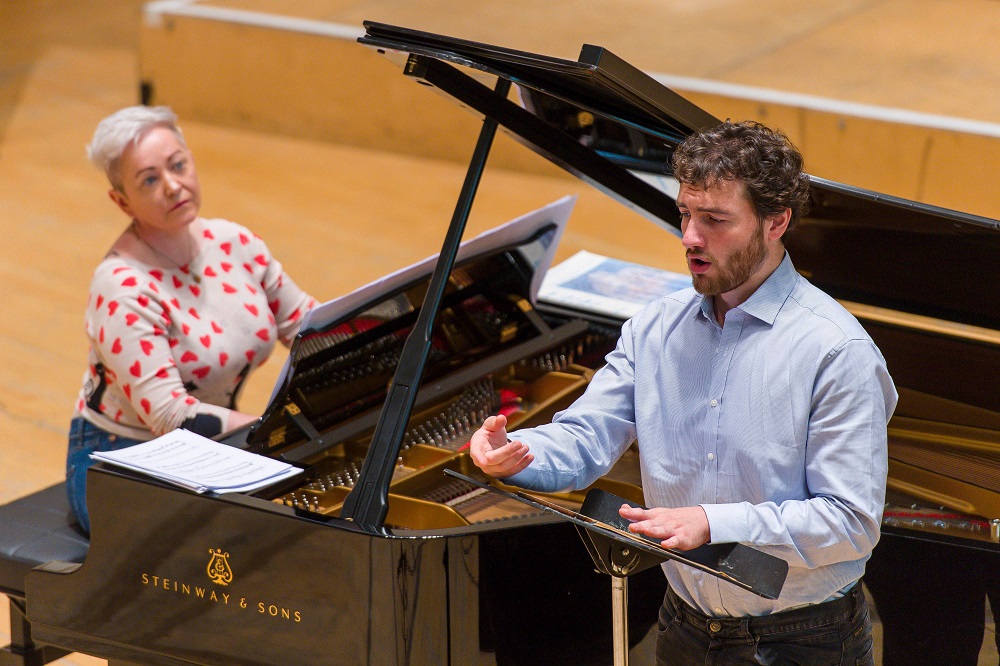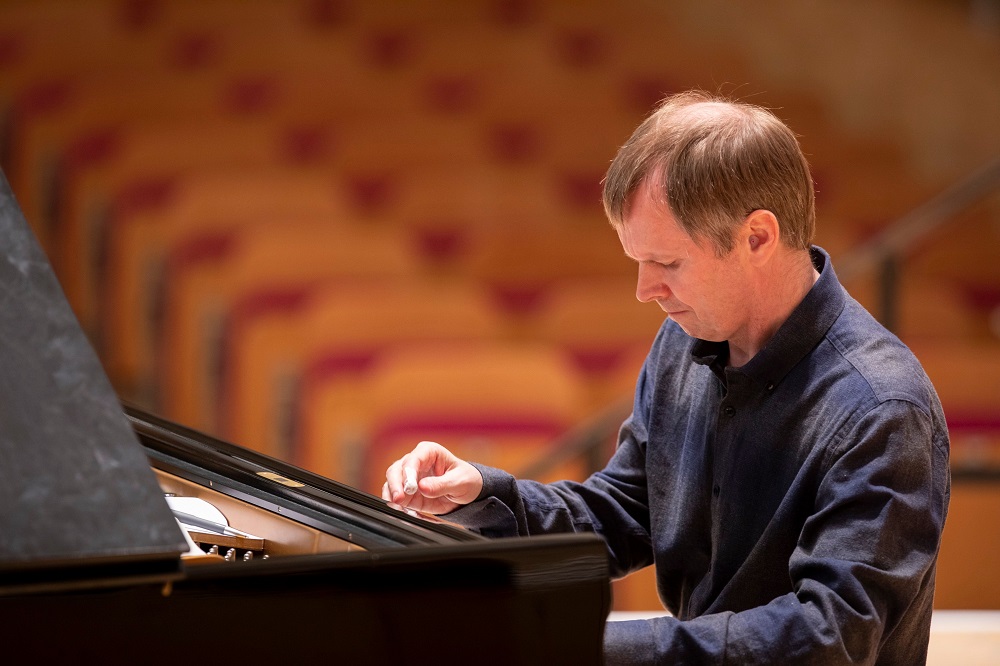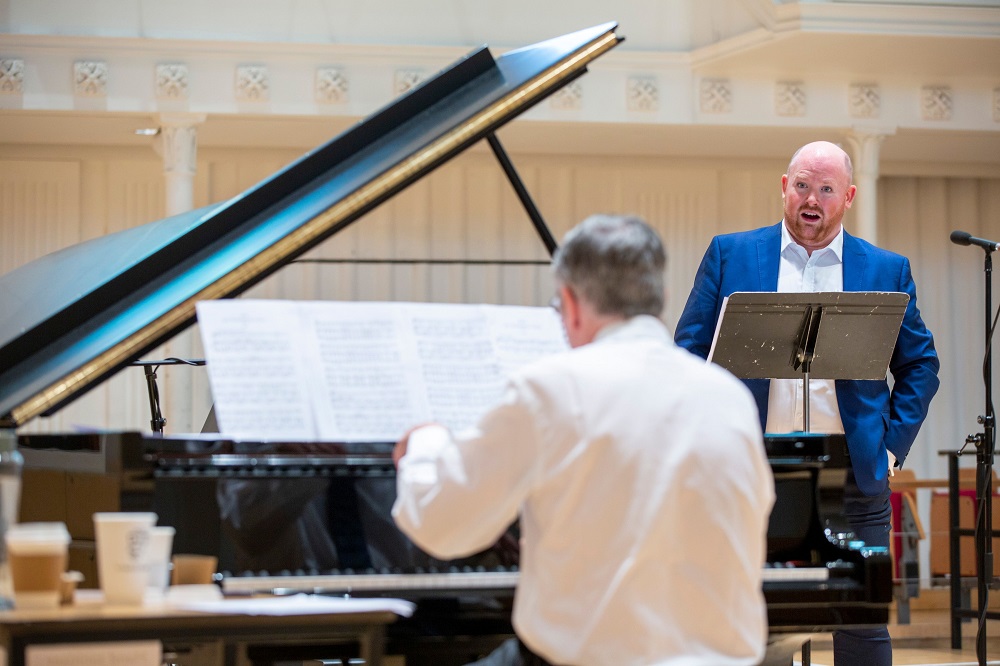After the success of BBC Radio 3’s live lunchtime broadcasts from the Wigmore Hall, live music is now kicking off again north of the border, with four concerts broadcast from City Halls, Glasgow, presented by Kate Molleson. Sadly, due to "unforeseen circumstances" the recitals were not filmed and streamed as originally planned – something which does take away from the overall audience experience – but it’s still thrilling to know that City Halls is once again ringing with music.
Starting the series was a recital from the young Glasgow-born bass-baritone Michael Mofidian and pianist Julia Lynch (pictured below), in a programme aptly entitled "Music when no-one else is near". Beginning with Schubert’s "Der Wanderer", Mofidian sang with a rich, gorgeously darkly hued bass-baritone, while Lynch displayed some real wizardry at the keyboard, with sympathetic and evocative playing.  Mofidian has a particular love of Russian song, and the programme continued with a set of songs by Tchaikovsky, including "I bless you, forests" set to the poetry of Leo Tolstoy, to which Mofidian lent a glowing warmth. Ravel’s cycle Don Quichotte à Dulcinée was powerful but tender, with vibrant splashes of colour from Lynch in the third and final piece, "Chanson à boire". It felt here like singer and pianist were interacting with a playful camaraderie and that theirs is a fun and fruitful musical relationship.
Mofidian has a particular love of Russian song, and the programme continued with a set of songs by Tchaikovsky, including "I bless you, forests" set to the poetry of Leo Tolstoy, to which Mofidian lent a glowing warmth. Ravel’s cycle Don Quichotte à Dulcinée was powerful but tender, with vibrant splashes of colour from Lynch in the third and final piece, "Chanson à boire". It felt here like singer and pianist were interacting with a playful camaraderie and that theirs is a fun and fruitful musical relationship.
Wednesday’s offering saw powerhouse Scottish pianist Steven Osborne (pictured below) play Schubert’s last piano sonata, D960 in B flat major. Without a video, one can really focus on listening, catching every nuance of the piece which Osborne so wonderfully illuminates. Some of the best music-making here is heard in the silences: brief, barely noticeable pauses which give the piece its drama. The finale was played both with a light delicacy, and a gradually increasing energy as the music neared its end. The colourful Impromptu with which Osborne began the concert, D935, was played equally exquisitely, a fitting prelude to the meaty sonata that followed.  In a change from the planned line-up, due to the illness of John Butt, tenor Nicky Spence and pianist Malcolm Martineau (pictured below) performed a selection of songs they’ve worked on and collected together over the years. Hugo Wolf’s "Ihr seid die Allerschönste" ("You are the most beautiful") was performed with ardent singing and lush piano, almost transporting the listener to the sunny streets of Sienna where the poem is set. A few settings of Scottish lyrics featured in this concert: works by Benjamin Britten, and the Glasgow-born Buxton Orr. Spence released a recording of songs by the latter in 2017, and performed two works from the cycle Songs of a Childhood, "Shy Geordie" and the charmingly theatrical "Auld Mrs Murdy".
In a change from the planned line-up, due to the illness of John Butt, tenor Nicky Spence and pianist Malcolm Martineau (pictured below) performed a selection of songs they’ve worked on and collected together over the years. Hugo Wolf’s "Ihr seid die Allerschönste" ("You are the most beautiful") was performed with ardent singing and lush piano, almost transporting the listener to the sunny streets of Sienna where the poem is set. A few settings of Scottish lyrics featured in this concert: works by Benjamin Britten, and the Glasgow-born Buxton Orr. Spence released a recording of songs by the latter in 2017, and performed two works from the cycle Songs of a Childhood, "Shy Geordie" and the charmingly theatrical "Auld Mrs Murdy".  Friday’s concert was the one I was the most disappointed nor to have seen, though I used my imagination to envisage the stage, which resembled, according to Molleson, an "obstacle course". While I wish there had been a visual complement to the myriad magical sounds being made by percussionist Colin Currie, there is something to be said for focusing on the aural only. Danish composer Per Nørgård’s Fire over Water for multiple percussion was punchy and exhilarating, and it was hard to believe there was only one performer. Much of Currie’s focus here was on the marimba: TROMP Miniature, by Bryce Dessner (who’s also known for being the guitarist in the acclaimed rock band The National) explores the instrument’s full range, and Currie made the instrument sing with a multitude of voices. Another multi-percussion work, Asanga by South African composer Kevin Volans was bold and visceral as it raced through pulsing rhythms.
Friday’s concert was the one I was the most disappointed nor to have seen, though I used my imagination to envisage the stage, which resembled, according to Molleson, an "obstacle course". While I wish there had been a visual complement to the myriad magical sounds being made by percussionist Colin Currie, there is something to be said for focusing on the aural only. Danish composer Per Nørgård’s Fire over Water for multiple percussion was punchy and exhilarating, and it was hard to believe there was only one performer. Much of Currie’s focus here was on the marimba: TROMP Miniature, by Bryce Dessner (who’s also known for being the guitarist in the acclaimed rock band The National) explores the instrument’s full range, and Currie made the instrument sing with a multitude of voices. Another multi-percussion work, Asanga by South African composer Kevin Volans was bold and visceral as it raced through pulsing rhythms.














Add comment